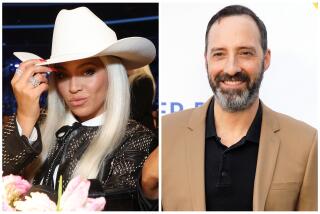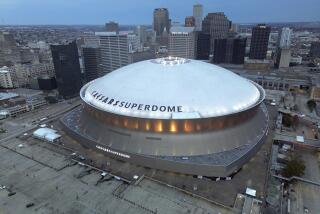Firms tread carefully around ‘Super Bowl’ in ads
With Super Bowl XLVI just days away, advertisers are in an all-out blitz, pitching everything from pizzas to TVs in conjunction with the biggest sporting event of the year.
The ads often feature “super” savings and football themes, but one thing is conspicuously absent from nearly all of them: the name of the game itself.
Trademarked and tenaciously defended by the NFL, the phrase “Super Bowl” is available to just a handful of official sponsors that pay significant amounts for the right to include the name in their marketing efforts. Everyone else, from national electronics retailers to the corner bar, runs the risk of being threatened with a lawsuit by the league if they use the actual name without permission.
“When we become aware of a potential violation, we will be very aggressive, and sending a cease and desist letter would be the first step,” NFL spokesman Brian McCarthy said.
The NFL has 22 official marketing partners that pay upward of $100 million annually to be affiliated with the league. Sponsors include PepsiCo Inc., Verizon Communications Inc., Motorola Mobility Inc. and Castrol Ltd., which is the official motor oil of the NFL. Although there is no specific sponsorship of the Super Bowl, NFL sponsors have the right to use the game’s name and logo in their own marketing efforts, McCarthy said.
The rest of the retail world must tightrope the sidelines to tap into Super Bowl sales, a phenomenon that has grown in lock step with the game itself.
Last year, more than 111 million viewers watched the Super Bowl, the largest TV audience of all time, according to Nielsen. The average game watcher will drop $63.87 on merchandise, clothing and snacks, with total consumer spending for this year’s Super Bowl expected to reach a record $11 billion, according to a recent survey by the National Retail Federation.
Making a connection to the game, however tenuous, can be lucrative for advertisers and a source of aggravation for the league. The NFL sends out 80 to 100 cease-and-desist letters each year to businesses promoting some Super Bowl special, usually based on a tip from a competitor that is “playing by the rules,” McCarthy said.
“They’re trying to draft off the goodwill that we’ve built up over the past 46 years with the Super Bowl,” McCarthy said. “Part of the reason we’ve been able to build up the Super Bowl is by protecting our intellectual property. We’re very protective of where and to whom we extend our rights. We need to protect the NFL shield. We need to protect the Super Bowl mark for our brand.”
Advertisers have come up with many ways to skirt the Super Bowl trademark issue. Electronics retailer H.H. Gregg Inc., which is based in Indianapolis, the site of this year’s game, is running a multimedia campaign promoting its 2012 Super Sale XLVI, which is emblazoned on a football shield.
Papa John’s International Inc.may be the official pizza sponsor of the Super Bowl, but Pizza Hut is expecting to sell more than 2 million pizzas Sunday with its Big Deal for the Big Game, a promotion offering any pizza for $10.
Glenview, Ill.-based electronics retailer Abt Inc. is urging customers on its website to “Get Ready for The Big Game” with savings on all HDTVs.
“We are aware of the trademark,” said Jennifer Arocena, marketing coordinator for Abt, a 76-year-old family-owned business. “We get around it with ‘game time’ or ‘big game’ and a football image, but people know what time of year it is — it’s the Super Bowl.”
Many marketers refer to the Super Bowl simply as “The Big Game,” a substitution so ubiquitous that the NFL tried to trademark that phrase in 2006. The move was opposed by a long list of advertisers, but ultimately it was undone by a college football rivalry between UC Berkeley and Stanford University that has been known as “The Big Game” for more than a century. The league abandoned that trademark application in 2007.
“Their goal was so that nobody could even refer to it in any way possible in a commercial without paying them for the right to do it,” said David Silverman, a Washington media attorney who pens an annual blog on the Super Bowl trademark issue.
Silverman said the NFL is “more aggressive than it needs to be” in protecting the Super Bowl trademark. But like a heavy-hitting linebacker patrolling his turf, intimidation plays a factor in resolving nearly every case in the league’s favor.
“When you get a cease-and-desist letter from the NFL threatening suit, you’re going to stop using the word ‘Super Bowl’ in your commercial, whether or not it would actually be permitted, if push came to shove, in a legal decision,” Silverman said.
Although it’s out of bounds for most advertisers, Silverman said journalists are free to refer to the Super Bowl in stories, a right that was assured by a 1992 federal appeals court ruling in California that two newspapers could use the name of the pop group The New Kids on the Block in a 1-900-number poll question.
The ruling, known as nominative fair use, allows the use of a trademarked name when there is no better way to refer to something, as long as the use doesn’t imply sponsorship. Silverman said that standard could well prevail if an advertiser were to go to court with the NFL about the Super Bowl trademark.
“If you are not implying false sponsorship or affiliation, it may well be, from a strictly legal perspective, that it’s OK to say the words ‘Super Bowl’ in a commercial,” Silverman said.
Given the NFL’s aggressive history on the issue, it’s not something he advises.
“The best advice is, when it comes to commercials, don’t use the term ‘Super Bowl,’” Silverman said. “It may not be the most precise advice, and it may not even be the most legally accurate advice, but it’s certainly the safest advice.”
Meanwhile, the corner bar with a banner promoting chicken wings and big screen TVs for Super Bowl Sunday is probably OK, at least for now.
“From a practical standpoint, the NFL is not going after local bars promoting the Super Bowl,” McCarthy said. “But if it says the official Super Bowl or NFL party, that would be different.”






